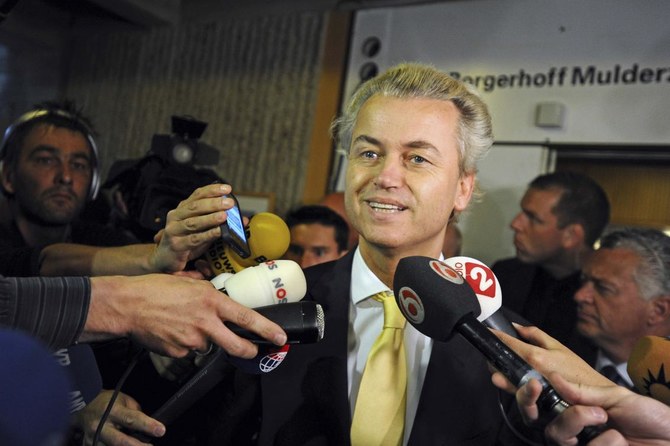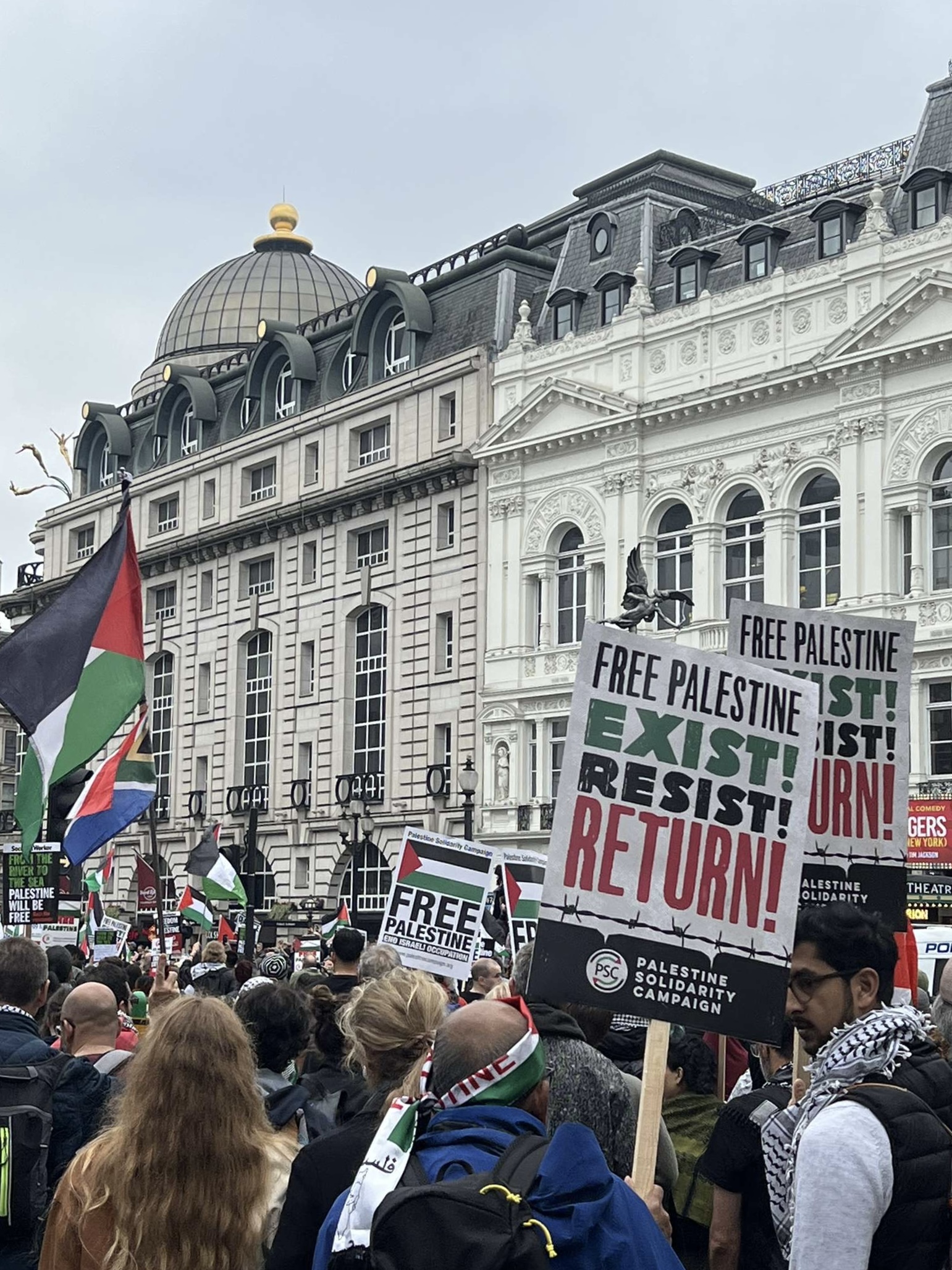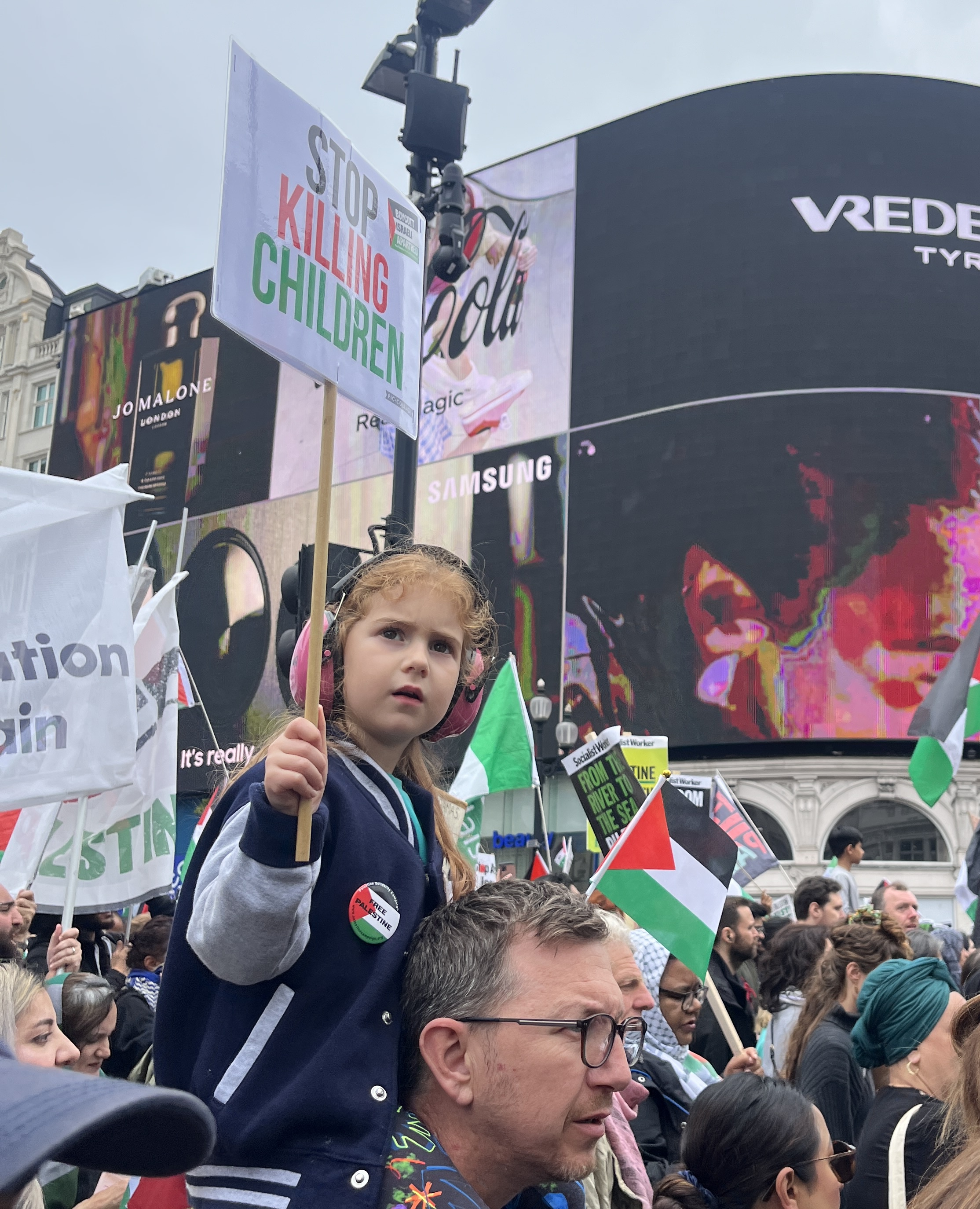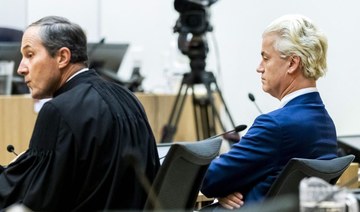THE HAGUE, Netherlands: The party of anti-Islam populist Geert Wilders won a huge general election victory in the Netherlands, according to a nearly complete vote count early Thursday, that showed a stunning lurch to the far right for a nation once famed as a beacon of tolerance.
The result will send shock waves through Europe, where far-right ideology is on the rise, and puts Wilders in line to lead talks to form the next governing coalition and possibly become the first far-right prime minister of the Netherlands.
With nearly all votes counted, Wilders’ Party for Freedom was forecast to win 37 seats in the 150-seat lower house of parliament, two more than predicted by an exit poll when voting finished Wednesday night and more than double the 17 the party secured in the last election.
Wilders got a standing ovation when he met his lawmakers at the parliament building Thursday morning.
“Can you imagine it? 37 seats!” he said to cheers.
Other political parties were holding separate meetings to discuss the election’s outcome before what is likely to be an arduous process of forming a new governing coalition begins Friday.
Wilders’ election program included calls for a referendum on the Netherlands leaving the European Union, a total halt to accepting asylum-seekers and migrant pushbacks at Dutch borders.
It also advocates the “de-Islamization” of the Netherlands. He says he wants no mosques or Islamic schools in the country, although he has been milder about Islam during this election campaign than in the past.
Although known for his harsh rhetoric, Wilders began courting other right-wing and centrist parties by saying in a victory speech that whatever policies he pushes will be “within the law and constitution.”
His victory appeared based on his campaign to curtail migration -— the issue that caused the last governing coalition to quit in July — — and to tackle issues such as the Netherlands’ cost-of-living crisis and housing shortages.
“I think, to be honest, very many people are very focused on one particular problem, which is immigration,” voter Norbert van Beelen said in The Hague on Thursday morning. “So I think that’s what people voted for, immigration and all the other aspects of leaving the European Union looking very inward as opposed to outward are just forgotten. It’s all about immigration.”
In his victory speech, Wilders said he wants to end what he called the “asylum tsunami,” referring to the migration issue that came to dominate his campaign.
“The Dutch will be No. 1 again,” Wilders said. “The people must get their nation back.”
Wilders, long a firebrand who lashed out at Islam, the EU and migrants, was in the past labeled a Dutch version of Donald Trump. His positions brought him close to power but never in it.
But to become prime minister of a country known for compromise politics, he must persuade other party leaders to work with him in a coalition government.
That will be tough as mainstream parties are reluctant to join forces with him and his party, but the size of his victory strengthens his hand in any negotiations.
Wilders called on other parties to constructively engage in coalition talks. Pieter Omtzigt, a former centrist Christian Democrat who built his own New Social Contract party in three months to take 20 seats, said he would always be open to talks.
The closest party to Wilders’ in the election was an alliance of the center-left Labour Party and Green Left, which was forecast to win 25 seats. But its leader, Frans Timmermans, made clear that Wilders should not count on him as a partner.
“We will never form a coalition with parties that pretend that asylum-seekers are the source of all misery,” Timmermans said, vowing to defend Dutch democracy.
The historic victory came one year after the win of Italian Premier Giorgia Meloni, whose Brothers of Italy’s roots were steeped in nostalgia for fascist dictator Benito Mussolini. Meloni has since mellowed her stance on several issues and has become the acceptable face of the hard right in the EU.
Hungarian Prime Minister Viktor Orban, who boasts of turning Hungary into an “illiberal” state and has similarly harsh stances on migration and EU institutions, was quick to congratulate Wilders. “The winds of change are here! Congratulations,” Orban said.
During the final weeks of his campaign, Wilders somewhat softened his stance and vowed that he would be a prime minister for all Dutch people, so much so that he gained the moniker Geert “Milders.”
The election was called after the fourth and final coalition of outgoing Prime Minister Mark Rutte resigned in July after failing to agree to measures to rein-in migration.
Rutte was replaced as the head of his People’s Party for Freedom and Democracy by Dilan Yeşilgöz-Zegerius, a former refugee from Turkiye who could have become the country’s first female prime minister had her party won the most votes. Instead, it was forecast to lose 10 seats to end up with 24.
The result is the latest in a series of elections that is altering the European political landscape. From Slovakia and Spain, to Germany and Poland, populist and hard-right parties triumphed in some EU member nations and faltered in others.
In The Hague on Thursday, Dutch voter Barbara Belder said that Wilders’ victory “is a very clear sign that the Netherlands wants something different.”
In political shift to the far right, anti-Islam populist Geert Wilders wins big in Dutch elections
https://arab.news/zkj5e
In political shift to the far right, anti-Islam populist Geert Wilders wins big in Dutch elections

- The result will send shock waves through Europe, where far-right ideology is on the rise
- Wilders’ election program included calls for a referendum on the Netherlands leaving the European Union
1m march in London to mark 76 years of Nakba

- 2-km march led by Palestinian photojournalist Motaz Azaiza
LONDON: About 1 million people peacefully marched in London on Saturday to commemorate the 76th anniversary of the Nakba (Catastrophe), which saw the expulsion of nearly 800,000 Palestinians from their homeland when Israel was established in 1948.
Regular Saturday marches in London since the Gaza war began last October have drawn hundreds of thousands of participants.

Crowds gathered at the BBC headquarters for a 2-km march led by Palestinian photojournalist Motaz Azaiza and a group of young British Palestinians carrying large lock keys, which symbolize their inalienable right to return to their homes under international law.
Azaiza’s Instagram following has surged to over 18 million as he documented the daily realities of Israel’s invasion and relentless bombardment of Gaza.
Since January, the 24-year-old has been traveling worldwide to advocate for a ceasefire and an end to the Israeli occupation.
“I didn’t believe that I’d stay alive to stand today here in London in front of the people. You saw me there under the bombing,” he told the crowd.
“You made me hope that there was hope. I didn’t believe in anyone, but … today, the moment I saw you all I thought there’s hope. The hope is in the people, not in the governments.”
Several pro-Palestinian organizations across the UK organized the march, calling on the British government to halt arms exports to Israel and restore funding to the UN Relief and Works Agency for Palestine Refugees in the Near East.
“Today, we reflect on the reality that this Nakba couldn’t be sustained by Israel without the enduring complicity of Western powers, including successive UK governments,” said Ben Jamal, director of the Palestine Solidarity Campaign.
“Today, even in this darkest moment, we also march to celebrate and affirm the refusal of the Palestinian people to succumb to erasure. We won’t stop, we won’t rest, until the Palestinian people finally achieve their liberation.”

The rally was met with a much smaller counter-protest carrying Israeli flags. There were only eight arrests reported by the London Metropolitan Police.
Parts of northern India scorched by extreme heat with New Delhi on high alert

NEW DELHI: Parts of northwest India sweltered under scorching temperatures on Saturday, with the capital New Delhi under a severe weather alert as extreme temperatures strike parts of the country.
India’s weather department expects heat wave conditions to persist across the north for the next few days, and has put several states on high alert. On Friday, parts of New Delhi reported up to 47.1 degrees Celsius. The nearby states of Punjab, Haryana and Rajasthan also saw temperatures soar and are likely to stay high over the next few days, said Soma Sen Roy, a scientist at the India Meteorological Department.
Roy cautioned people against going outdoors under the afternoon sun, drink lots of water and wear loose-fitting clothes while those who are especially vulnerable like the elderly should stay indoors.
The extreme temperatures in northern India coincide with a six-week-long general election, with experts worried that the heat wave could increase health risks as people wait in long lines to cast their vote or candidates campaign aggressively in the outdoors. One minister fainted due to heat last month while addressing an election rally in Maharashtra state.
Satish Kumar, a 57-year-old rickshaw driver in the capital, said his work was suffering because of the heat. “People are not coming outside, (markets) are nearly empty,” he said.
Pravin Kamath, a 28-year-old who runs a cart selling cold drinks, complained that it was so hot he could hardly stand being outdoors. “But I must work. What can I do? I am poor so I have to do it.”
The main summer months — April, May and June — are always hot in most parts of India before monsoon rains bring cooler temperatures. But the heat has become more intense in the past decade and is usually accompanied by severe water shortages, with tens of millions of India’s 1.4 billion people lacking running water.
A study by World Weather Attribution, an academic group that examines the source of extreme heat, found that a searing heat wave in April that struck parts of Asia was made at least 45 times more likely in some parts of the continent by climate change.
Asian activists call out Western feminists over ‘selective empathy’ on Gaza

- Non-Western feminists say white supremacy, imperialism are inherent to Western feminism
- Seven months into Israel’s deadly war on Gaza, feminists in the West have been largely silent
JAKARTA: When Western actresses and female politicians cut their hair to protest the death of Mahsa Amini or rallied against the Taliban ban on girls’ education, they stood up to defend women’s rights. However, the zeal went missing when it came to Palestine, non-Western feminists say, denouncing their peers’ silence on Israel’s killing of women in Gaza.
Mass protests and displays of solidarity in Europe and the US broke out in 2022 and carried on into 2023 following the death in Iranian police custody of the 22-year-old Amini, who was charged with breaching hijab rules. In the same years, when the Taliban barred Afghan girls from school, women united in outcry and called for international pressure against them.
But more than seven months into Israel’s indiscriminate killing, wounding, and maiming of Palestinian civilians, the West’s mainstream feminist movement has been largely silent.
At least 35,800 people in Gaza have been killed and 80,000 wounded by Israeli airstrikes and ground offensive that have destroyed most of the enclave’s infrastructure and rendered it uninhabitable.
The majority of the dead are women and children. Many have lost their lives as most of the hospitals have been flattened by Israeli troops and no medical assistance could reach them.
The International Rescue Committee estimated last month that 37 mothers had been killed in Gaza each day and 60,000 pregnant women had no access to midwives or doctors, while tens of thousands struggled with breastfeeding as they were so malnourished due to Israel’s blockade of humanitarian aid.
In the face of the widely documented atrocities, Haein Shim, Korean activist and spokesperson of Haeil, a Seoul-based feminist group, told Arab News that Western feminists were exhibiting “selective empathy” and “double standards” with regard to Israel’s onslaught, the criticism of which has regularly been labeled as “antisemitism” — not only by Israeli authorities but by Western leaders as well.
“I strongly believe these issues are interconnected with racism, imperialism, and colonialism,” Shim said.
“We need to urge each other to break the silence and unite against occupation and subjugation, Israel’s human rights abuses and ongoing genocide. One thing to be clear: Our solidarity does not mean antisemitism but only to end the vicious genocide and violence against women and children.”
While Shim believes it is not too late for “global feminist solidarity” with women in Gaza, Fadiah Nadwa Fikri, Malaysian human rights lawyer and scholar focused on decolonization, sees an intrinsic flaw in Western feminism, which might prevent it.
“The function of Western feminism, which is inherently imperialist, is to reduce and dehumanize not only Palestinian women and children but also Palestinian men, who have been subjected to decades of Israeli settler colonialism, with the full support of US imperialism and its allies in Europe,” she said.
“It is, therefore, not surprising to witness the deafening silence of most Western feminists, who are staunch advocates of this strand of feminism, in the face of relentless imperialist violence in Gaza and all of historical Palestine. Their silence is an endorsement of the status quo.”
For Fikri, Western feminism has been shaped by “the racist narrative of the clash of civilizations,” and its silence on Gaza was merely consequential.
“We see women like Madeline Albright, Condoleezza Rice, Hilary Clinton, Kamala Harris — both white and non-white — who depict themselves as champions of women’s rights become members of the ruling classes of imperialist states that are responsible for the mass death, destruction, and suffering around the world,” she said.
“Therefore, there are no double standards of Western feminism; there is only one political standard meant to protect the interests of the imperialist ruling classes, which has been applied consistently.”
In the context of Israel and accusations of antisemitism fired against its critics, Asian feminists also cited the problem of white supremacy, which they closely linked with Zionism.
“Zionist ideologies are not just harming and discriminating against Palestinians, and the destruction of Palestine is not merely about Palestine. Zionism is about white supremacy and colonization, and the destruction of Palestine is just another example of imperialist violence inflicted by Western colonizers, aka white people,” said V., member of Chinese Feminism in Toronto, a Canada-based grassroots collective, who requested to remain anonymous.
“If we consider the sociopolitical context of North America, we know most Jews are also white people, yet we do not have the space to discuss the complexity of antisemitism and white supremacy simultaneously. I guess that speaks a lot (as to) why white feminists tend to be hypocritical here.”
Her colleague, G., also a member of the group, said that hypocrisy was also present among non-white women leaders who were “internalizing whiteness” and embracing Zionism.
“We need to understand this should not be done in our names. We need to have firm voices and expose these leaders as Zionist agents and complicit in genocide, instead of accepting the fact that our elected leaders turn complicit and no longer represent us. We need to hold them accountable,” she said.
“Decolonization is not just theory. We all need to move beyond the bystander observer position and let Palestine radicalize us. We need to continue to educate ourselves and our communities on colonial feminism/pinkwashing and purplewashing.”
Part of the struggle is debunking pro-Israel propaganda and fighting “against the utilization of antisemitism to shut down any criticism against Israeli or Zionist policies,” according to Okky Madasari, Indonesian novelist and academic, whose research focuses on knowledge production and censorship.
“There must be a unified campaign to stop believing anything coming out from the Israeli authorities. They are liars unless they are proven otherwise,” she told Arab News.
For those activists who for the past seven months have been silent over Gaza, Okky suggested that they stop using the feminism label altogether.
“You should be ashamed of yourself if you don’t speak up against Israel when you are so fussy about many other more trivial things,” she said.
“Condemning Israel and taking sides with the Palestinians is what any decent human being must do, let alone if you are a feminist.”
Parts of northern India scorched by extreme heat with New Delhi on high alert

- India’s weather department expects heat wave conditions to persist across north for next few days
- On Friday, parts of New Delhi reported up to 47.1°C, with temperatures also soaring in nearby states
NEW DELHI: Parts of northwest India sweltered under scorching temperatures on Saturday, with the capital New Delhi under a severe weather alert as extreme temperatures strike parts of the country.
India’s weather department expects heat wave conditions to persist across the north for the next few days, and has put several states on high alert.
On Friday, parts of New Delhi reported up to 47.1 degrees Celsius (116 degrees Fahrenheit). The nearby states of Punjab, Haryana and Rajasthan also saw temperatures soar and are likely to stay high over the next few days, said Soma Sen Roy, a scientist at the India Meteorological Department.
Roy cautioned people against going outdoors under the afternoon sun, drink lots of water and wear loose-fitting clothes while those who are especially vulnerable like the elderly should stay indoors.
The extreme temperatures in northern India coincide with a 6-week-long general election, with experts worried that the heat wave could increase health risks as people wait in long lines to cast their vote or candidates campaign aggressively in the outdoors. One minister fainted due to heat last month while addressing an election rally in Maharashtra state.
Prime Minister Narendra Modi as well as his main challenger, Rahul Gandhi of the opposition Congress Party, are expected to hold rallies in New Delhi later on Saturday, as the city heads to the polls on May 25.
Satish Kumar, a 57-year-old rickshaw driver in the capital, said his work was suffering because of the heat. “People are not coming outside, (markets) are nearly empty,” he said.
Pravin Kamath, a 28-year-old who runs a cart selling cold drinks, complained that it was so hot he could hardly stand being outdoors. “But I must work. What can I do? I am poor so I have to do it.”
The main summer months — April, May and June — are always hot in most parts of India before monsoon rains bring cooler temperatures. But the heat has become more intense in the past decade and is usually accompanied by severe water shortages, with tens of millions of India’s 1.4 billion people lacking running water.
A study by World Weather Attribution, an academic group that examines the source of extreme heat, found that a searing heat wave in April that struck parts of Asia was made at least 45 times more likely in some parts of the continent by climate change.
Climate experts say extreme heat in South Asia during the pre-monsoon season is becoming more frequent and the study found that extreme temperatures are now about 0.85 C (1.5 F) hotter in the region because of climate change.
At least 28 heat-related deaths were reported in Bangladesh, as well as five in India in April. Surges in heat deaths have also been reported in Thailand and the Philippines this year, according to the study.
Extreme heat is fast becoming a public health crisis in India, with more than 150 people dying last year during heat waves. The government estimates nearly 11,000 people have died during heat waves this century, yet experts say such figures are likely a vast undercount.
Slovak PM Fico stable but in serious condition

- Robert Fico underwent a two-hour operation on Friday that increased hopes for his recovery
- Slovak police have charged a man identified by prosecutors as Juraj C. with attempted murder
BANSKA BYSTRICA, Slovakia: The condition of Slovak Prime Minister Robert Fico has stabilized but remains serious, the country’s health minister said on Saturday, following Wednesday’s assassination attempt against the central European leader.
Slovakia’s deputy prime minister also said the transfer of Fico to the capital Bratislava from the small-town hospital near the area where he was shot five times at point blank range would not take place in the coming days.
There was no need to formally take over Fico’s official duties and some communication with the premier was taking place, Deputy Prime Minister Robert Kalinak told reporters in front of the hospital where Fico was being treated.
Fico underwent a two-hour operation on Friday that increased hopes for his recovery. The attack sent shockwaves throughout Europe and raised concerns over the polarized and febrile political situation in the nation of 5.4 million people.
Slovak police have charged a man identified by prosecutors as Juraj C. with attempted murder. Local news media say he is a 71-year-old former security guard at a shopping mall and the author of three collections of poetry.



















